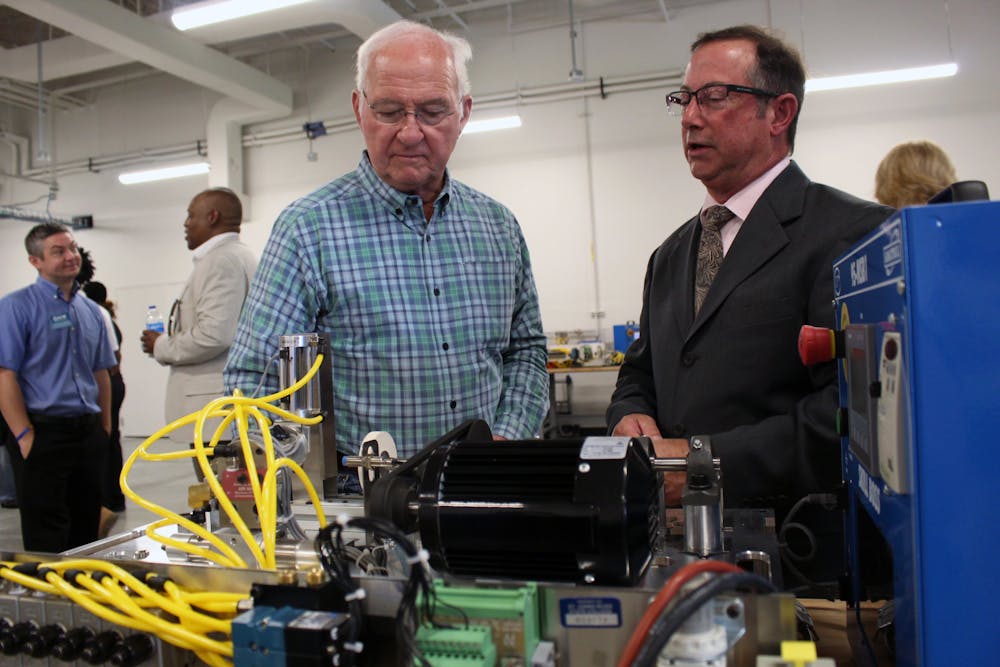AI can perform quick, repetitive jobs like data entry and customer service. But there are still some careers that require a human touch — or chipping hammer.
With the implementation of AI in the workforce on the rise, the demand for trade labor has grown. Trade labor, or skilled trade, is a career requiring technical skills and hands-on involvement to maintain and develop infrastructure.
Santa Fe College opened the Ralph W. Cellon Jr. Institute to help foster the future of blue-collar employees and its own demand for trade skills, including welding and air conditioning.
Blue-collar jobs have been experiencing an increase in both opportunities and demand over the past decade. The development of AI in the workforce leads many individuals to opt for jobs that are less threatened by newer technologies. For many, such as 32-year-old Santa Fe alumnus Rowdy Turner II, trade jobs are the most stable option.
“Learning how to weld is a doorway to hundreds of different things that you can do,” he said.
Turner earned a certificate in welding technology from Santa Fe in 2024, and he currently works in Gainesville as a welder contracted under Miller Electric. But the former Dollar General warehouse manager said his love for welding wasn’t the only factor that pushed him to pursue his current career full-time.
“AI [is a] reason why people are turning to it. That’s why I turned to it,” Turner said, referring to his job as a welder.
Turner learned Santa Fe offered a welding certification program as he transitioned to metalwork after a stroke lost him his warehouse job. Upon enrolling, he discovered there was a long waitlist of people who were also seeking to earn their certification in welding technology.
Turner said he nearly “begged” the admissions director to allow him into the program “as soon as possible.” Now, thanks to Santa Fe’s newest institute, more people like him will be able to learn metalwork trades.
On Aug. 19, Santa Fe opened the Ralph W. Cellon Jr. Institute for Skilled Trades and Advanced Manufacturing on its Northwest Campus. According to Paul Broadie II, Santa Fe president, the facility represents the college’s commitment to workforce development.
The institute expanded the trade programs at Santa Fe College, specifically those in welding and heating, ventilation and air conditioning, or HVAC. It added an engineering technology advanced manufacturing degree program as well.
The institute has more classroom space for students to participate in hands-on activities and lessons. The new institute is set to double the school’s capacity for welding.
Broadie said the institute is meant to capitalize on growing job opportunities. Welding jobs anticipate a 6.9% job growth annually, and HVAC jobs expect an 8.9% growth annually for the foreseeable future, Broadie said.
While blue-collar demand is increasing, some white-collar jobs are struggling to expand.
Having fewer employees to pay offers an incentive to business owners, said Simon Rendall, the vice president of e-commerce for Pyramid Global Hospitality, a property-management company.
Rendall has worked with AI hands-on for over three decades, and he incorporates it into marketing strategies for the brand.
Rendall said one hotel Pyramid Global Hospitality works with utilizes AI for customer service chats on its website. The property no longer needs many employees to handle phone calls because its AI chatbot answers people’s questions on its own without the consumer needing to interact with a living person.
“You don’t need to expand your workforce as much,” Rendall said. “That’s something that a lot of people in our industry are looking at.”
Hospitality isn’t the only white-collar field that AI has been affecting. Careers in fields like history, sales, customer service and writing face risks with the rise of AI, according to research by Microsoft.
Rendall said he was worried several common “white-collar skills are going to be consumed by AI solutions.”
While the future of AI is uncertain, it will continue to develop as a system that maximizes efficiency and time management, agreed UF engineering professor Diego Alvarado.
“AI is a technology that is here,” Alvarado said. “It’s not even coming. It’s here, and we need to adapt to it.”
Contact Leona Masangkay at lmasangkay@alligator.org. Follow them on X @leo_amasangkay.

Leona is a second-year journalism student and the Fall 2025 Santa Fe College reporter. They previously worked on the audience and growth team over the summer as a social media strategist. In their free time, Leona enjoys going to the gym, listening to music and watching Marvel movies.






